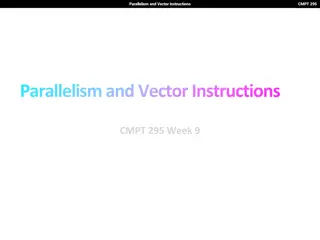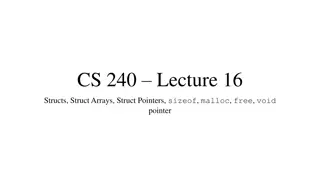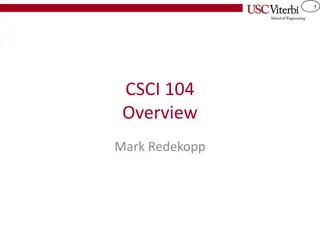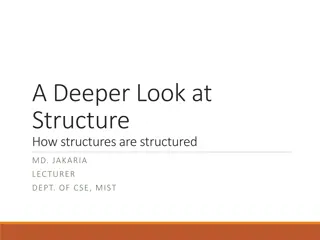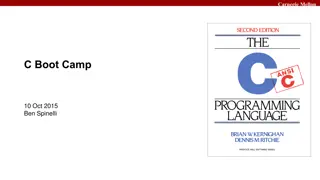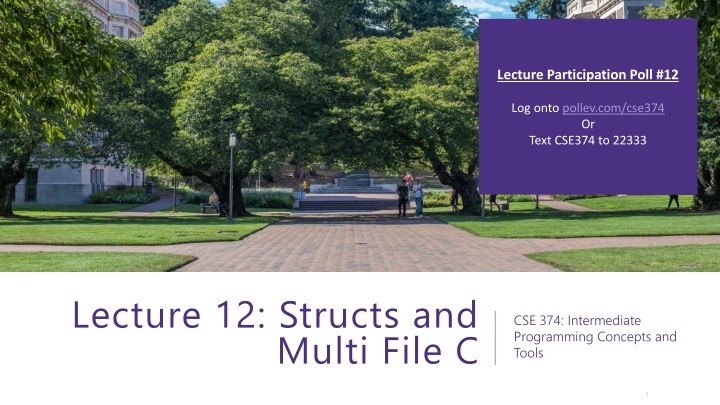
Intermediate Programming Concepts and Tools: Structs, Typedef, Type Casting, Pointer Casting
Explore intermediate programming concepts in C language including structs, typedef, type casting, and pointer casting. Learn about data types in C, type aliasing with typedef, converting between types, and managing pointers effectively. Dive into the world of C programming with practical examples and detailed explanations.
Download Presentation

Please find below an Image/Link to download the presentation.
The content on the website is provided AS IS for your information and personal use only. It may not be sold, licensed, or shared on other websites without obtaining consent from the author. If you encounter any issues during the download, it is possible that the publisher has removed the file from their server.
You are allowed to download the files provided on this website for personal or commercial use, subject to the condition that they are used lawfully. All files are the property of their respective owners.
The content on the website is provided AS IS for your information and personal use only. It may not be sold, licensed, or shared on other websites without obtaining consent from the author.
E N D
Presentation Transcript
Lecture Participation Poll #12 Log onto pollev.com/cse374 Or Text CSE374 to 22333 Lecture 12: Structs and Multi File C CSE 374: Intermediate Programming Concepts and Tools 1
Administrivia Assignments HW2 Live - Soft Deadline Thursday October 29th at 9pm PST - Don t need to zip files - More hints added! HW3 coming this week Reminder: Midpoint Deadline Friday November 6th at 9pm PST Review Assignment Live Due Wednesday - 24 hrs late 20% penalty - 48 hrs late 50% penalty - Not accepted more than 48hrs late CSE 374 AU 20 - KASEY CHAMPION 2
Data Types in C void - a place holder numbers int, short, long, double, float (signed, unsigned) char a very short int (1 byte) interpreted as a printable character pointers (T*) stores address of where a value is stored in memory arrays (T[]) implicit promotion to pointer when passed as an argument to a function or returned from a function booleans not defined in C so instead we use values, 0 or NULL is interpreted as false, anything else true Advanced: Union T, Enum E, Function Pointers, Structs CSE 374 AU 20 - KASEY CHAMPION 3
Typedef A function that creates an alias for an existing type typedef <type> <name>; Example: In C, strings are char* but we can rename them to string typedef char* string; int main(int argc, string *argv) { string s = hello, world ; printf( %s\n , s); } CSE 374 AU 20 - KASEY CHAMPION 4
Type-casting casting casting converting one type to another If E is a numeric type and T is a numeric type: To wider type, get same value To narrower type, may not get same value (employs mod operator) From floating point to int, will round (may overflow) From int to floating point, may round (int to double is exact on most machines) (T)E * same as Java main () { int sum = 17, count = 15; double mean; mean = (double) sum / count; printf(Value of mean: %f\n , mean); } CSE 374 AU 20 - KASEY CHAMPION 5
Pointer-casting If be has type T1*, then (T2*)E is a (pointer)cast Does not alter the address stored, but used to manage types void evil (int **p, int x) { int *q = (int*)p; *q = x; } void f(int **p) { evil(p, 345); **p = 17; // writes 17 to address 345 best case crash } CSE 374 AU 20 - KASEY CHAMPION 6
Structs structs structs are a method of constructing new datatypes - store a collection of values together in memory, fields - similar to a Java class, but no methods - individual values are referred to using the . operator - can use typedef to rename and turn struct tag into a type typedef struct Cat Cat; or typedef struct Cat { } Cat; Then you don t need keyword struct Cat mercy; instead of struct Cat mercy; struct Cat { char *name; int age; char *breed; } int main() { struct Cat mercy; mercy.name = Iron Fist No Mercy ; mercy.age = 6; mercy.breed = Pixie Bob ; } CSE 374 AU 20 - KASEY CHAMPION 7
Parameters / Arguments Function parameters are initialized with a copy of corresponding argument - If the argument is a pointer, the parameter value will point to the same thing (pointer is copied) - arrays are passed as pointers - Structs are passed as a copy by default, so it is more common to intentionally pass as pointers - avoids copying large objects - allows manipulation of original struct <- allows creation of methods that manipulate new type, like Java - to access members you must dereference the pointer (*) and access the field (.) use parenthesis to ensure dereference happens first - (*ptr). has a shortcut: ptr-> Cat (*ptr) = (Cat*)malloc(sizeof(Cat)); (*ptr).age = 6; (*ptr).age++; ptr->age; CSE 374 AU 20 - KASEY CHAMPION 8
Example: Pointer.c // constructor for a new Point Point newPoint() { Point p; p.x = 0; p.y = 0; return p; } // translateX moves one point horizontally by deltax void translateX(Point* p, int deltaX) { p->x += deltaX; // OR (*p).x += deltaX; } // translateX_wrong won't move the original point void translateX_wrong(Point p, int deltaX) { p.x += deltaX; } // print out the point. void print(Point* p) { printf("p = (%d, %d)\n", p->x, p->y); } // note: here we could pass by value void print_point(Point p) { printf("p = (%d, %d)\n", p.x, p.y); } // main tests the Point struct int main(int argc, char **argv) { Point p = newPoint(); printf ("Show point.\n"); print(&p); // pass by reference translateX(&p, 12); print(&p); printf ("Show incorrectly translated point.\n"); translateX_wrong(p, 12); print(&p); printf ("But pass by value works for print.\n"); print_point (p); } // constructor for a new Point Point newPoint() { Point p; p.x = 0; p.y = 0; return p; } CSE 374 AU 20 - KASEY CHAMPION 9
Linked Lists #include <stdlib.h> #include <stdio.h> int main() { Node *n1 = make_node(4, NULL); Node *n2 = make_node(7, n1); Node *n3 = make_node(3, n2); typedef struct Node { int value; struct Node *next; } Node; printf( "%d%d%d\n", n3->value, n3->next->value, n3->next->next->value Node *make_node(int value, Node *next) { Node *node = (Node*)malloc(sizeof(Node)); node->value = value; node->next = next; return node; } ); free(n3); free(n2); free(n1); } CSE 374 AU 20 - KASEY CHAMPION 10
Multi-File C Programming You can split C into multiple files! - What if we wanted to use Linked List code in a different project? - If the linked list code is long, it can make files unwieldy - What if we want to separate our main from the struct definitions Pass all .c files into gcc: gcc -o try_lists ll.c main.c Must include code header files to enable one file to see the other, otherwise you have linking errors CSE 374 AU 20 - KASEY CHAMPION 11
Sharing code across files #include <stdlib.h> #include <stdio.h> Must always declare a function or struct in every file it s used in - Thank goodness C lets us separate declarations and definitions ;) - Include function header as definition Node *make_node (int value, Node *next); - Include struct type definition typedef struct Node { int value; struct Node *next; } Node; typedef struct Node { int value; struct Node *next; } Node; Node *make_node(int value, Node *next); int main() { Node *n1 = make_node(4, NULL); Node *n2 = make_node(7, n1); Node *n3 = make_node(3, n2); #include <stdlib.h> typedef struct Node { int value; struct Node *next; } Node; // rest of main main.c } Node *make_node(int value, Node *next); Node *make_node(int value, Node *next) { Node *node = (Node*)malloc(sizeof(Node)); node->value = value; node->next = next; return node; } CSE 374 AU 20 - KASEY CHAMPION ll.c 12
Header Files typedef struct Node { int value; struct Node *next; } Node; Node *make_node(int value, Node *next); ll.h Copying your function declarations to every file you want to use them is not fun - If you forget to make a change to all of them, confusing errors occur! #include <stdlib.h> #include <stdio.h> #include "ll.h" A header file header file (.h) is a file which contains just declarations #include inserts the contents of a header file into your .c file - Put declarations in a header, then include it in all other files - Two types of #include #include <stdio.h> - Used to include external libraries. Does not look for other files that you created. #include "myfile.h" - Used to include your own headers. Searches in the same folder as the rest of your code. Node *make_node(int value, Node *next) { Node *node = (Node*)malloc(sizeof(Node)); node->value = value; node->next = next; return node; } ll.c #include "ll.h" int main() { Node *n1 = make_node(4, NULL); Node *n2 = make_node(7, n1); Node *n3 = make_node(3, n2); // rest of main main.c } CSE 374 AU 20 - KASEY CHAMPION 13
#ifndef LL_H #define LL_H Header Guards typedef struct Node { int value; struct Node *next; } Node; Consider the following header structure: - Header A includes header B. - Header C includes header B. - A source code file includes headers A and C. - The code now includes two copies of header B! - Solution: "header guard header guard" Node *make_node(int value, Node *next); #endif ll.h #include <stdlib.h> #include <stdio.h> #include "ll.h" #include "ll.h" Node *make_node(int value, Node *next) { Node *node = (Node*)malloc(sizeof(Node)); node->value = value; node->next = next; return node; } int main() { Node *n1 = make_node(4, NULL); Node *n2 = make_node(7, n1); Node *n3 = make_node(3, n2); // rest of main } main.c ll.c CSE 374 AU 20 - KASEY CHAMPION 14
Libraries in C Remember #include <stdio.h>? That tells our .c file what function declarations are in stdio.h, but what about the function definitions? (i.e. the code) We don't have access to stdio.c Instead, we have a pre-compiled library that we can call functions within - The stdio library is included by default with gcc In C, these "libraries" are called object files CSE 374 AU 20 - KASEY CHAMPION 15
Object Files All C code is broken down into functions When compiled, a function is turned into "machine code" which the physical CPU electronics can understand Object files contain the machine code for the functions within These define the complete behavior of a function and can be called from your own C code CSE 374 AU 20 - KASEY CHAMPION 16
Linking in C Every time you have compiled something with gcc, you have actually been doing two things: - Compiling - Linking Compiling: Translating C code (a single .c file) into machine code stored in object files Linking: Combining many object files into one executable Building multiple programs which use some of the same source code - Compile each object once and re-use it for multiple executables Many files - Slow-to-compile files which you don't change often don't have to be re-compiled - incremental compilation: Huge projects can take hours or days to compile from scratch! We can save time by only re-compiling what has changed. CSE 374 AU 20 - KASEY CHAMPION 17
Dependency Graph: linked list project CSE 374 AU 20 - KASEY CHAMPION 18
Example Consider this dependency graph. What files (source and object) are required when building program_two? A. b, e B. b, e, g C. a, b ,c, e, f D. b, e, f, g, h E. b, d, e, f, g, h CSE 374 AU 20 - KASEY CHAMPION 19
Automating Dependency Graphs with Make make is a program which automates building trees of dependencies - List of rules written in a Makefile declares the commands which build each intermediate part - Helps you avoid manually typing gcc commands single rule specifies: - An output file to be generated (also called a target) - List of input files (also called sources) - List of commands which will turn the input files into the output file "To build this target, make sure you have these files available, and then run these commands" Make can check when you've last edited each file, and only build what is needed! - Files have "last modification date". make can check whether the sources are more recent than the target. Rule syntax: ll.o: ll.c ll.h gcc -c ll.c CSE 374 AU 20 - KASEY CHAMPION 20
Appendix CSE 374 AU 20 - KASEY CHAMPION 21

